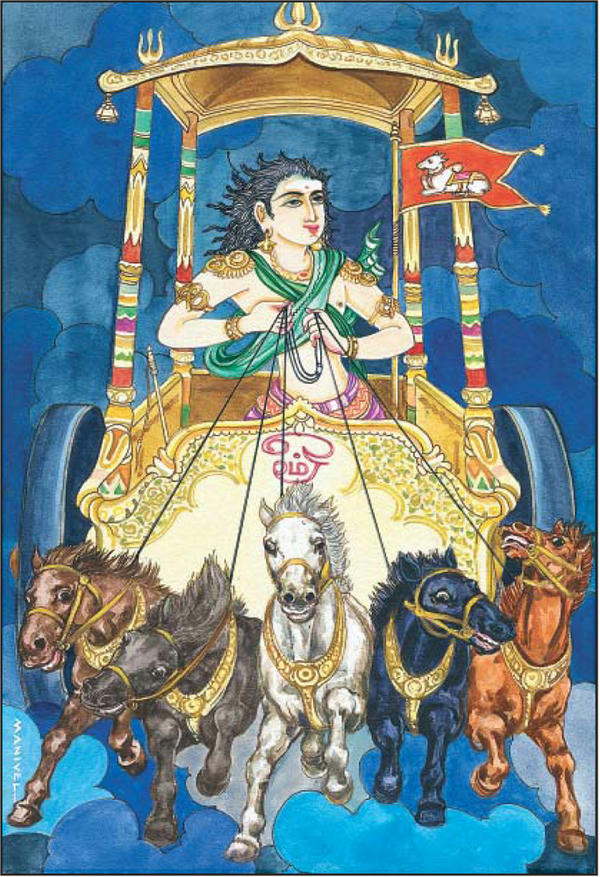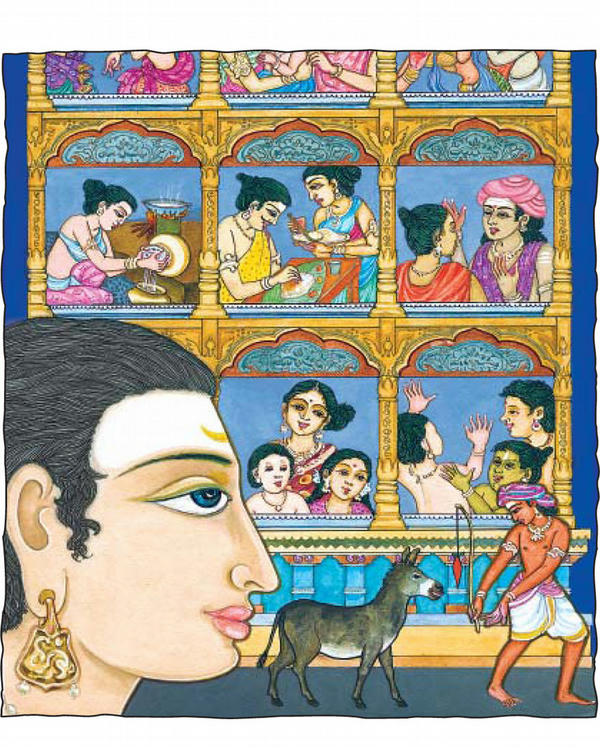2. The Soul Controls Instincts, Intellect, Ego
Sadhana Practice§
Suggestions for Wandering: For the first few minutes of wandering watch your intellect think and notice particularly how active it is. Then sit and for a few minutes and regulate your breath by breathing nine counts in, hold one, nine counts out, hold one. Keep your eyes open during this breathing exercise. Then again focus on your intellect and see how much the thought activity has slowed down.§
Quote from Gurudeva§
Seeking for God in the depths of one’s being through control of the mind, control of one’s thoughts, feelings and emotions, gives birth to the highest qualities of nature. This transformation begins to take place as the light of the soul becomes more and more apparent within the mind.§
Supplementary Reading§
Man’s nature can be described as three-fold: superconscious or spiritual, intellectual or mental and instinctive or physical-emotional. It is the instinctive nature, the animal-like nature, which contains the tendencies to become angry and harm others. The goal is to learn to control these animal instincts as well as the ramifications of the intellect and the pride of the ego and manifest one’s spiritual nature. (Bodhinatha)§

In our last spiritual identity exercise we focused on the idea that we are not our body, mind or emotions. In this exercise, we are taking this idea one step further by saying that the goal is to learn to control the body, mind and emotions. Specifically, we are focusing on three types of control:§
Controlling the animal instincts
Controlling the ramifications of the intellect
Controlling the pride of the ego§
When we are successful in controlling these three, our spiritual nature naturally manifests.§
Gurudeva quote: “When the instinctive mind becomes lifted into the light, a person is strong enough to be kind when he could have become angry. He generates enough spiritual power to be generous when he might have reacted selfishly. Disciplined periods of meditation nurture a magnanimous and benevolent nature. Such a being is naturally in the light of the supreme consciousness. His great strength is humility, a shock absorber for the malicious experiences in life. Humility makes one immune to resentment and places everything in proportion and balance within the mind. A person lacking in humility does not give the appearance of being firmly rooted and poised within himself. At the other extreme, the arrogant person who lives in the shadows of the mind presents a pitiful picture of insecurity and incompleteness.”§
Instincts§
Bodhinatha quote: One way we become a more spiritual person is gaining control over the tendencies of our instinctive mind. The instinctive mind comes along with having a physical body. If we didn’t have a physical body, we wouldn’t have an instinctive mind. It comes along with it. You can’t get one without the other—it’s a package deal! If you want to be here on Earth to unfold spiritually, you have to work through the animal instincts that come along with the physical body and gain better control over them. Each of the ten yamas gives us a different tendency of the instinctive mind to restrain. Therefore, they are invaluable tools in helping someone on the spiritual path gain better control over the instinctive nature.§
Looking at each of the ten yamas and the instinct which it helps restrain would take far too much time and is worthy of a number of classes in itself. So we have chosen just one yama which is any easy one to relate to which is moderate appetite, mitahara. §
The instinctive tendency we are focusing on harnessing is the tendency to eat too much as well as foods that are not good for our health. Gurudeva states: “Mitahara is a restraint that we must all obey and which is one of the most difficult. However, gaining controlling over our appetite helps us have greater control over all the other instinctive tendencies. So in making progress with this yama, we also progress in all the others as well.” §
Gurudeva’s last point is an important one— gaining controlling over our appetite helps us have greater control over all the other instinctive tendencies. This highlights the fact that controlling our appetite is a very worthwhile endeavor as it automatically increases our control over other instincts.§
A simple way to increase our control over our appetite is by fasting on a regular basis such as on pradosha days. Another is to avoid the tendency to overcome the emotion of unhappiness by overeating and develop a new habit to replace it such as going to the temple to attend puja to change unhappiness to happiness.§
Intellect§
Let’s turn now to the second point of controlling the ramifications of the intellect. Here are four keys as to how we can control its ramifications.§
FIRST KEY: The first key is the concept in our last spiritual identity exercise which is that we are not the intellect but the soul. This insight helps us not put all our energy into constantly acquiring more intellectual knowledge. We do not feel a great need to know all about the latest trends in the world. We are also less inclined to engage others in intellectual debates to show the superiority of our intellect to theirs. §
SECOND KEY: Gurudeva has a relevant aphorism in his writing “Cognizantability” which says “The intellect strengthened with opinionated knowledge is the only barrier to the superconscious.” This is taking the idea of not being the intellect one step further by emphasizing that in fact when it is filled with the opinions of others it is an obstacle to experiencing our soul, our superconscious intuition. §
THIRD KEY: Regulating our breath quiets down our thinking mind. This is called pranayama and the basic form of it is nine counts in, hold one, nine counts out, hold one.§
FOURTH KEY: Refraining from excessive talk is also quite helpful in harnessing the intellectual mind. It also helps us awaken observation which is the first faculty of the awakening of the superconscious regions. §
In our guru parampara, one of Chellappaswami’s great sayings is Naam Ariyom, which means. “We do not know.” Yogaswami’s famous remark was, in scolding a devotee who spent too much time reading books on philosophy: “It’s not in books, you fool.” When it comes to spirituality, the intellect cannot help us experience the soul. It can help us do a lot of things. It can help us run a computer, it can help us go shopping, it can help us cook, it can help us calculate. It is a useful tool, it is not that the intellect is not good. It just does not have any place when it comes to experiencing our soul. It can be the barrier. Said another way, the goal is to make the intellect a tool of the soul, subservient to the soul, rather than dominant over it. §
Ego§
Let’s turn now to the third point of controlling the pride of the ego. This is the idea of feeling superior to others, being conceited. Of course, a sense of superiority comes from identifying with body, mind and emotions. And all of our spiritual practices help lessen any pride we have. However, here is one specific suggestion.§
In informal discussions as well as in formal meetings, such as a committee, refrain from dominating the meeting with your ideas. Be respectful of the opinion of each person who is present. Furthermore, approach the meeting with the strategy that the best meeting is one in which creativity is present and the final concept exceeds the ideas that any individual brought to the meeting.§
Additional Resources§
Merging with Śiva, Chapter 10: From Darkness to Light§
